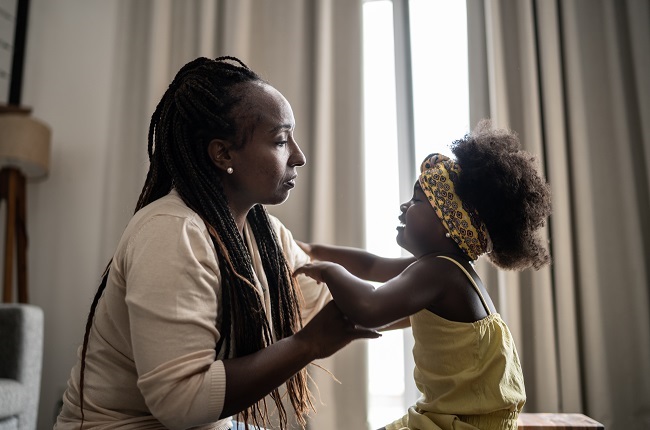
Shaming makes an individual or a child feel bad because of something they have said or done. The act of shaming when someone does something wrong does not help with their growth and is unlikely to have the desired results on their behaviour.
Humiliation is done to shame or embarrass someone publicly. This is a painful experience, and it can cause that person to hate you.
Read: Daddy shaming: family and friends are usually the main offenders
Parents often use shaming and humiliation with their children, hoping that if they feel bad about what they did in front of everyone, they will never do that again.
- But is that always the case?
- Is this the best way you can parent your child?
- What can you do better instead of disciplining your child?
We find out from a local mom, ex-school counsellor, and teacher who now works independently coaching and consulting on non-violent discipline, Peace Discipline, Karen Quail.
She also shares what parents can do instead of shaming and humiliating their children.
Quail states that shaming and humiliating children happen when, instead of focusing on the behaviour that needs to be corrected, the parent or teacher tries to make the child feel as bad as possible.
She says that adults do this by using naughty, pathetic, hopeless, and useless words or shaming messages like 'don't be a baby', 'what's wrong with you?', or 'you should be ashamed of yourself'.
Quail agrees that shaming and humiliation are similar, but humiliation has a more public aspect. Humiliation causes the child to feel bad in front of others.
There don't have to be a lot of others, "for example, when a parent removes clothing items, such as pulling a child's pants down and spanking them, the child may feel humiliated even if the only other person present is the person beating them. Humiliation does damage that goes far beyond the physical pain," says Quail.
Also read: Amy Schumer claps back at moms who shamed her for returning to work.
Teachers humiliating a child
Quail recalls an incident of humiliation shared in one of the workshops she ran. She says that the story was about a five-year-old girl who wet her bed at a boarding school.
When the boarding masters found out what she had done, they made the little girl stand, wrapped around with the wet sheets, while her peers walked past her to the assembly.
Quail recalls another incident from when she was attending primary school: where one teacher used to send pupils to stand in the dustbin in the corner, in front of the class, saying that they were "rubbish."
Quail says that while putting a child in timeout if they are being disruptive may be called for in certain situations, humiliating a child the way the teachers did in these examples is abusive and unnecessary.
Must see: Parenting the boss: why you should support your child's entrepreneurship dreams
Here is what to do instead
Quail believes that as teachers and parents, 'it is our job to guide children, reassure them when they make mistakes or feel less confident about themselves, and teach them what to do instead, supporting them to do better in the future. The first step is to get in touch with the child's feelings and use those feelings to guide us."
"Think about the last time you made a mistake or did something wrong. Remember how bad you felt about this. Now ask yourself what you needed from your loved one," says Quail.
She encourages us to think about how at that moment, we felt terrible because we knew we did something wrong and how we needed reassurance or to be reminded that we are loved instead of being reminded of the mistake that we made.
"Instead of hammering the child about what they did wrong. Focus on what the child needs to do better next time. Explain what you would like them to do when a similar situation arises," she advises.
Also see: 'It is discipline, not punishment': A mother's tips on avoiding a bedtime blow-up.
Is this a new behaviour?
Quail says that as a parent, you know your child. She advises parents to find out what may have resulted in the behaviour.
"Also, note whether this is a new behaviour or if they usually react the same way when something happens", she suggests.
"If they are upset or ashamed, as many of us feel when we have made a mistake, help them calm down by offering understanding and reassurance. This will increase the likelihood that they will turn to you in future when they don't know how to deal with such feelings," she added.
Quail says that in a situation where the child is lashing out and being aggressive, listening may reassure them enough to calm them down, but it won’t always work.
Alternatively, if that's not working for your child, you could use a timeout, cool down or keep others safe from them and then resolve the issue later when everyone is calm.
Perhaps then you can guide them into some form of restorative action, such as apologising or doing something to make amends.
Watch the video below for more information and examples:
Chatback:
Share your stories and questions with us via email at chatback@parent24.com. Anonymous contributions are welcome.
Don't miss a story!
For a weekly wrap of our latest parenting news and advice, sign up for our free Friday Parent24 newsletter.




 Publications
Publications
 Partners
Partners











